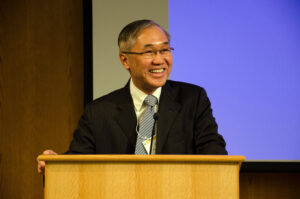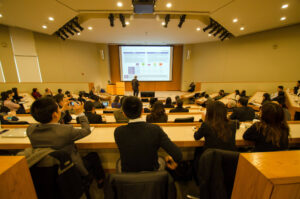Duke Daytime MBA Student Blog

Highlights from the 2015 Duke Asia Business Conference

The Duke University Asia Business Conference is a university-wide conference held at Fuqua that aims to educate participating students and professionals on the evolving business opportunities in Asian markets. Distinguished business leaders from finance, consulting, technology, healthcare, and other sectors joined us as panelists and presenters at this year’s fifth annual conference titled “Unveiling Asia: the Secrets of Success and the Next Growth Frontier,” which was attended by over 100 students and business professionals.
Differences in institutions, policies, and culture often present the biggest obstacles to conducting business in Asia. Asian business trade organizations such as the Asia-Pacific Economic Cooperation (APEC) and the Association of Southeast Nations (ASEAN) have a powerful impact in shaping the business relations between Asian countries and the United States. Our speakers provided a comprehensive overview on how these policies affect day-to-day business in Asia and their relevance to multinational corporations when conducting global commerce.
Here are some of the highlights:
First Keynote Address: “ASEAN: Another BRIC in the Wall”

Presented by Pakpoom Vallisuta, Global Executive MBA ’98, member of Fuqua’s Board of Visitors and East Asia Regional Advisory Board, and co-founder and chairman of The Quant Group—an investment banking firm in Thailand.
Mr. Vallisuta introduced the formation of major Asia trade organizations, specifically ASEAN, and how they will be the major drivers in Southeast Asia’s economy. He identified that although China had been the largest manufacturing nation in Asia for the last decade, issues such as rapidly increasing labor cost and reliance on export-led growth hinder China’s future growth. Vallisuta argues that ASEAN countries, if capitalized and focused on their resources and ability strategically, will be able to avoid China’s fate. ASEAN should focus on evolving toward brand equity, resolute toward free flows of trade, services, labor, capital, and investments, and capitalize on their abundance agricultural and resources bases.
Second Keynote Address: “Economic Prospects for Southeast Asia”
Presented by Adam Schwarz, BA ‘83 and founder and CEO of the Asia Group Advisors—a strategy and capital advisory firm in Singapore.
Mr. Schwarz presented the four major goals of ASEAN which include becoming a highly-integrated global business unit, forming a single market and production base, creating equitable economic development, and evolving to be a competitive economic region. He pointed out the real challenge behind the organization is its lack of involvement with private sectors. “Three out of four ASEAN citizens have no real understanding of the organization’s goal and function,” he said.
To more effectively achieve its goal and move this large economic unit that combines $2.4 trillion GDP and a population of 633 million, ASEAN should be focusing on combating the political tensions and attracting involvement from private business units. Schwarz used Indonesia’s recent business reform success as an example to demonstrate the possibility to unite fragmented sectors in achieving greater business opportunities and foreign investments in Southeast Asia.
Special Guest Speaker: Thai Ambassador

As part of the conference, Ambassador Pisan Manawapat delivered his first speech in the United States as Thai Ambassador to the U.S. He presented several major accomplishments by Thai corporations and the country’s role in ASEAN. Manawapat explained Thailand’s advantageous business offerings to foreign investment, including a high degree of freedom monetarily and in business and labor. As one of the dominate members of ASEAN, the Thai government and major corporations anticipate that business trends will evolve from original equipment manufacturing to global brand building.
Discussion Panel 1: Innovation in Asia
The growth of business in Asia has evolved beyond operations and manufacturing. Countless innovative businesses have been started in Asia in recent years, but many fail to persist. How are innovation processes formed differently in Asia, and how can these ideas be scaled to make worldwide impact? The panel focused on discussing the different innovative methods multi-national companies—including GSK, McKinsey, IBM, and John Deere—apply in Asia and how their U.S. counter parts collaborate and learn from their Asia experience.
Discussion Panel 2: Globalization in Asia
Echoing the keynote discussions, this panel dove deeply into explaining Asia’s role in forming a globalized economy. Speakers from PwC, Apple, Kimberly Clark and the North Carolina Chinese Business Association talked about the different challenges in addressing globalization issues from cultural, professional and personal aspects, and customized solutions for them.
Takeaways from Attendees

From speakers:
- “Fantastic work in including professionals from various industries and sectors in discussing a global topic.”
- “Highly selective audience with real interest and passion to learn about the Asia region.”
From industry professionals and the greater Duke community:
- “It’s amazing to see a student-run conference being able to demonstrate this level of diversity.”
- “Topics discussed are highly relevant to my everyday work, and I greatly enjoy listening to the speakers sharing their solutions in tackling some of these cultural and professional issues.”
- “Coming from the visiting scholar community, I am astonished to see the depth and breadth covered in this conference. This demonstrates Duke’s outstanding presence and knowledge in the international market.”
From Fuqua students:
- “One of the best conferences I attended at Fuqua. The discussion topics are clear, relevant, and easy to understand. I was able to walk away with an updated understanding about Asia.”
- “Coming from Indonesia, I am particularly interested and excited that the keynote was able to cover the country’s economic arena. Most of the MBA Asia Business conferences focus overwhelmingly on China and India, but this conference provides a full coverage and bigger picture.”
- “I greatly enjoyed the globalization panel, in which the discussion went beyond just the textbook content. The speakers included their personal examples to demonstrate ways to successfully lead global projects and drive business with local professionals.”



